And so I cry sometimes when I’m lying in bed
Just to get it all out, what’s in my head
And I, I’m feeling a little peculiar
And so I wake in the morning and I step outside
And I take a deep breath and I get real high
And I scream from the top of my lungs
“What’s going on?”
Do you remember that one-hit wonder by 4 Non Blondes from the mid-90s? Not every rock ballad in those years was singing about pathos and longing, about praying, about revolution. I wondered if they read Walter Brueggemann.
The first prayer in his new small collection Acting in the Wake: Prayers for Justice (WJK; $17.00 – our sale price = $13.60) starts with an admission: “We are a strange mix of amber waves of grain and rockets’ red glare.”
The prayer offered at his seminary for the National Day of Prayer continues, “We are a people blessed with flourishing land that is marked by beauty and prosperity. We are, at the same time, a people bent on war and domination, violence and torture. We mumble about our ambiguity. And then we notice we are in a free fall.” That was in 2014.
In a much earlier prayer, also written in Acting in the Wake, Brueggemann prays,
“We do not know how a church
could be shaped after the body of Jesus,
but you have promised it to us,
and so we ask for new beginnings.”
+++
A few years ago I reviewed a few books that asked if the word evangelical was still viable, still a useful indicator of core theological doctrines and a certain “Bible believing” faith. Some felt like this is their theological home and they want to remain steadfast in claiming the name, despite its being sullied. Others thought — out of loyalty to Jesus and faithfulness to the streams of the Spirit that makes up the church — that it was time to distance themselves from the alt-right, Christian-nationalist, MAGA-evangelicals. I knew that some of our BookNotes readers are not all a part of that tradition, and I still recommended the books to them; the honest self-reflection was a good model for self-aware, self-reflection for those in other theological camps or church traditions as well. For those who are (or were) evangelicals, the books were essential. Like that cry of that song title, they ask, “What’s Up?”
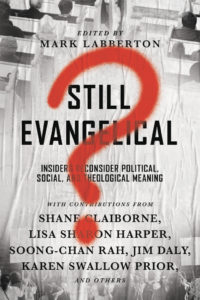 Of the several good ones exploring this territory, I recommended Still Evangelical? Insiders Reconsider Political, Social, and Theological Meaning edited by Mark Labberton (IVP; $24.00 – our sale price = $19.20) with pieces by Soong-Chan Rah, Lisa Sharon Harper, Jim Daly, Shane Claiborne and more. It’s a great collection and offers several different answers to the question. I’ve read most chapters more than once.
Of the several good ones exploring this territory, I recommended Still Evangelical? Insiders Reconsider Political, Social, and Theological Meaning edited by Mark Labberton (IVP; $24.00 – our sale price = $19.20) with pieces by Soong-Chan Rah, Lisa Sharon Harper, Jim Daly, Shane Claiborne and more. It’s a great collection and offers several different answers to the question. I’ve read most chapters more than once.
By a single author (a thoughtful and especially articulate one), I can hardly 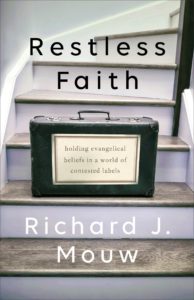 say enough about
say enough about 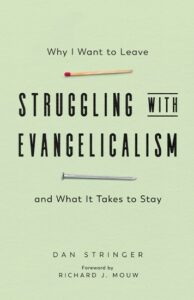 Struggling with Evangelicalism: Why I Want to Leave and What It Takes to Stay by Dan Stringer (IVP; $17.00 – our sale price = $13.60.) Richard Mouw wrote the forward to that one and his own mature ruminations are well worth reading, too — we’d love to send out some copies of his 2019 Restless Faith: Holding Evangelical Beliefs in a World of Contested Labels (Brazos Press; $22.00 – our sale price = $17.60.)
Struggling with Evangelicalism: Why I Want to Leave and What It Takes to Stay by Dan Stringer (IVP; $17.00 – our sale price = $13.60.) Richard Mouw wrote the forward to that one and his own mature ruminations are well worth reading, too — we’d love to send out some copies of his 2019 Restless Faith: Holding Evangelical Beliefs in a World of Contested Labels (Brazos Press; $22.00 – our sale price = $17.60.)
 Less personal, more scholarly, (and thicker, at 335 pages) but, again, nearly a must to understand the religious landscape of our lifetime, we recommend Evangelicals: Who They Have Been, Are Now, and Could Be edited by respected historians Mark Noll, David Bebbington and George Marsden (Eerdmans; $28.00 – our sale price = $22.40.) It’s a very carefully edited anthology with authors from Timothy Keller to Kristin Du Mez, Molly Worthen to Amanda Porterfield, Jemar Tisby to D.G. Hart, and many more.
Less personal, more scholarly, (and thicker, at 335 pages) but, again, nearly a must to understand the religious landscape of our lifetime, we recommend Evangelicals: Who They Have Been, Are Now, and Could Be edited by respected historians Mark Noll, David Bebbington and George Marsden (Eerdmans; $28.00 – our sale price = $22.40.) It’s a very carefully edited anthology with authors from Timothy Keller to Kristin Du Mez, Molly Worthen to Amanda Porterfield, Jemar Tisby to D.G. Hart, and many more.
If you’ve got any of these titles, it might be good to get ‘em out for a re-read. Or order those you don’t have. The crisis which precipitated such volumes is nowhere near over.
FOUR NEW ONES – ESSENTIAL READS
There are many new books exploring what has happened within the evangelical sub-culture. There are four recent ones that are stand-outs, must-reads. I want to briefly highlight them here. You can order, as always, by scrolling to the bottom of this column, using the link to our secure order page. All of us at Hearts & Minds thank you for your interest and your support of our south-central Pennsylvania bookstore. We’re broadly ecumenical and have very wide reading habits, but this stuff is close to home. We hope you order some at our 20% off BookNotes discount. Don’t forget to tell us how you’d like them shipped — USPS “media mail” (as we explain, below) is cheaper but a bit slower. We can ship any way you’d like or, if your in the area, swing by.
 Losing Our Religion: An Altar Call for Evangelical Christianity Russell Moore (Sentinel) $29.00 OUR SALE PRICE = $23.20
Losing Our Religion: An Altar Call for Evangelical Christianity Russell Moore (Sentinel) $29.00 OUR SALE PRICE = $23.20
This is a hugely important book, honest, clear, thoughtful, wise, nearly definitive for this genre of explorations of the religious coherency, complexities, idolatries, blessings and curses of the evangelical movement and Moore’s own Southern Baptist tradition, specially. I’ve met Moore a time or two and we’ve had lovely conversations about faith and books. He’s smart, gracious, kind, and astute. His earlier books were good, but this is significantly more important than anything he has yet done.
As the artful writer and singer-songwriter Andrew Peterson (of Rabbit Room fame) notes, Moore’s voice is “gentle, courageous” and “has a way of cutting through the blame of the age, right down to the marrow of what matters.”
The great civil rights voice John Perkins puts it bluntly: “Russell Moore tells it straight about how the church has lost its way.” As both reviewers not, for Moore, what really matters is Jesus.
Moore, as you may know, was for nearly a decade the voice of public policy concerns of the SBC, having replaced a retiring guy who was part of the first iteration of the Christian right; Moore said he was going to expand the social vision and public theology of the evangelical SBC to include — as the Bible teaches and as Jesus would want — creation care and racism, poverty and social justice concerns, even as he continued to advocate for classic Baptist policies around the right to life and religious freedom. It did not take long for the controversies to brew. When he spoke out against the logic of conservative Christians supporting a serial sexual abuser and chronic liar with little or no Biblical awareness, he became a target of pretty serious criticism in his denomination.
He hints at only some of this in the powerful introduction to Losing Our Religion but, whew, when he insisted that his denomination behave with compassion and transparency about the bubbling sexual abuse scandals, he became nearly a pariah among their old boy networks; to this day some call him foul names. I am summarizing in my own words, here, but he is candid about it all, and pushes us towards a more consistently Christian vision and a way out of our religiosity. I like how the theme of authentic, evangelical faith, trusting in Jesus — what his mentors and elders taught him, after all — comes across with thoughtful zeal. He doesn’t call us to rancor or power but to a Christ-like posture that lives into a consistent life of discipleship, in private and in public, in church and at work, in our families and in the public squares.
Moore sets out to convince us that the crisis in American evangelicalism is worse than we may think. It is counter-intuitive for some, but he suggests that this just might be good news.
Losing Our Religion has five major chapter titles entitled Losing our Credibility, Losing our Authority, Losing Our Identity, Losing our Integrity, and Losing our Stability.
The subtitle of each chapter is fascinating (again, whether you see yourself as an evangelical or not.)
-
- How Disillusion Can Save Us from Deconstruction
- How the Truth Can Save us from Tribalism
- How Conversion Can Save Us from the Culture Wars,
- How Morality Can Save Us from Hypocrisy
- How Revival Can Save Us from Nostalgia
Listen to Beth Moore — no relation, except she, too, was a conventional Southern Baptist who was treated viciously when she expressed opposition to the SBC Trumpism, church power-plays, and sexual abuse cover-ups. Beth writes:
Russell Moore’s Losing Our Religion is head-shakingly good. By the time I’d underlined at least one sentence in every paragraph of the first two chapters, I knew I was reading a book I’d keep within easy reach for years to come. Russ writers with a remarkable blend of clarity, color, and candor. More important, the ink on these pages is drawn from a deep well of biblical conviction that drives the author’s decisions. Here you go: a gift of gospel-centered sanity in a culture gone utterly mad.
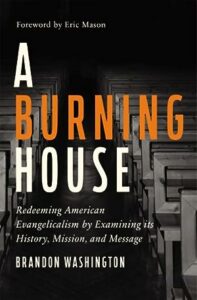 A Burning House: Redeeming American Evangelicalism by Examining Its History, Mission and Message Brandon Washington (Zondervan) $26.99 OUR SALE PRICE = $21.59
A Burning House: Redeeming American Evangelicalism by Examining Its History, Mission and Message Brandon Washington (Zondervan) $26.99 OUR SALE PRICE = $21.59
If Russell Moore is a sage and thoughtful evangelical leader, balanced and gracious, intellectually engaged but still a preacher at heart, Brandon Washington is nearly similar — but with a local church profit; he is a black pastor of a more contemporary sort of church in Denver, Colorado. A graduate of the Conservative Baptist Seminary there, the flyleaf bears a solid quote from a personal hero, the late, former President of what is now called Denver Seminary, Dr. Vernon Grounds. I think I first met Grounds when he was speaking in a tag-team event with the somewhat younger Ron Sider. The two were socially-active, deeply-evangelical, full-gospel gentlemen with commitments to evangelism and social justice. If Pastor Washington was shaped by Dr. Grounds, I am immediately his fan.
“American Evangelicalism is ablaze” cries Washington,, as he tells the story of how this large swath of American Protestants got to this point. There has been some sort of unity around doctrinal identity, he says, but for too long “divisions along ethnic and cultural lines have tarnished the movement’s witness.”
This remarkable book not only tells the story of how evangelicalism was captured by worldly ideologies and increasingly lost a clear sense of both orthodoxy and orthopraxy. It is not that other authors are unaware of this aspect of the large critique that is needed (more is not unaware of racial issues) but this book highlights this important part of the tale better than any book I’ve read recently about evangelicalism.
You should know this: the book title and its working metaphor comes from Dr. King. With desegregation on the horizon, MLK said, “I’ve come to believe that we are integrating into a burning house.”
As it says on the back cover, “As with the country, if we hope to fully integrate the American evangelical church, we must do so as firefighters.”
As one reviewer put it, this book is “equal measures hard and hopeful.” It invites us to both lament and repent.
Pastor Washington is a keen observer of history and offers a good overview of much that is important for us all. While he offers his historical and theological appraisal of American evangelicalism, it carries a weighty and appreciative foreword by East Coast black urban leader, Eric Mason. He notes that it is a “labor of love” and “enormously important in our time.” Pastor Mason says,
Brandon has given us a seminal tome for reflecting on the racial-justice issues of our day in a balanced, honest, healthy way and engaging them with godliness, grace, and scholarship.
Moore has quite an inside story to tell and he has been on media venues as diverse as The Trinity Forum and Morning Joe this week. Pastor Brandon Washington may not be as well known but his book is substantive and, while not scholarly, well researched and vivid. I highly recommend it.
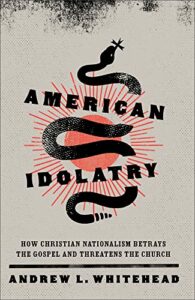 American Idolatry: How Christian Nationalism Betrays the Gospel and Threatens the Church Andrew Whitehead (Brazos Press) $24.99 OUR SALE PRICE = $19.99
American Idolatry: How Christian Nationalism Betrays the Gospel and Threatens the Church Andrew Whitehead (Brazos Press) $24.99 OUR SALE PRICE = $19.99
This brand new book is not exactly a study of evangelicalism but insofar as much of the mainstream, white evangelical movement has identified in one way or another with the advocates of this sort of ideology — that Whitehead identifies as idolatry — then this book is a urgent, key aspect of any wise and faithful assessment of evangelicalism itself. Evangelical historians like Calvin University professor Kristin Kobes Du Mez, herself a specialist in 20th century evangelicalism, says it is “an essential primer for anyone seeking to understand our current moment so we can chart a path toward a more just and compassionate future.”
Yes, as Whitehead shows, there have been theological and spiritual costs to the church/state problem that undergirds a uniquely Christian nationalism. It is clear that this ideology has infected all sorts of churches, but statistically, mores in evangelical congregations. It is a conversation that we must have and this book, as one advocate says, it is “a book whose time has come.” We need this book.
Here’s two good things you should know. Professor White head is an accomplished scholar in this field. He co-wrote a very important volume (Taking America Back for God) on Oxford University Press, which won the 2021 Distinguished Book Award from the Society of the Scientific Study of Religion. He runs a think-tank and research center of religion in American culture at Indianapolis University – Purdue. His PhD is from Baylor and is himself a devout Christian. As they say down south, he’s got a dog in this fight. So he is quite a well informed and nuanced scholar and a person of deep faith.
Secondly, you may want to know that this is written seemingly for an evangelical or at least a church-related, religious audience (while his previous one for a more general market of interested citizens and civic scholars.) He speaks less academically and is clear about the theological questions of idolatry that undergird any discussion of our views of the state, civil religion patriotism and whatnot. Perhaps not as accessibly simple as the excellent How to Be a Patriotic Christian: Love of Country as Love of Neighbor by Rich Mouw (VP; $17.00 – our sale price = $13.60) it is nonetheless a book that could be used in a church study group, an adult Sunday School class, or campus ministry program. It’s important, solid, helpful, every-so-timely, and inspiring. As one reviewer said, it is “crisply written and utterly compelling.” The Library Journal review called it “heartfelt.” It offers a faithful path forward.
With the precision of a scholar and the passion of a faithful Christian, Whitehead clarifies the difference between Christianity and Christian nationalism. By the end of this book, one discovers that it’s not only Christian nationalists who betray the gospel but also those Christians who remain quiet in the face of it. Required reading for anyone who claims to be Christian in this time of Christian nationalist fervor. — Kelly Brown Douglas, former dean of Episcopal Divinity School, professor, Union Theological Seminary, author of Resurrection Hope: A Future Where Black Lives Matter
We need this book. Now. With skill and grace, Whitehead explains the dangerous ideologies undergirding Christian nationalism, traces how it has infected the church, and provides practical guidance for those of us fighting it in our own communities. This is a book you should give to your friends, your family, and your pastor — Beth Allison Barr, professor, Baylor University; author of The Making of Biblical Womanhood: How the Subjugation of Women Became Gospel Truth
 The Evangelical Imagination: How Stories, Images, & Metaphors Created a Culture in Crisis Karen Swallow Prior (Brazos Press) $26.99 OUR SALE PRICE = $21.59
The Evangelical Imagination: How Stories, Images, & Metaphors Created a Culture in Crisis Karen Swallow Prior (Brazos Press) $26.99 OUR SALE PRICE = $21.59
While this extraordinary book is less overtly about the ugliness of evangelical nationalisms and political postures that are un-Christlike and the temptations of power that has seduced many evangelicals and charismatics who ought to know better, it does explore the deepest DNA, as we say these days, of the movement. I hope you saw my earlier review, back when we were still taking pre-orders.
As Karen puts it early on in the book,
If evangelicalism is a house, then these unexamined assumptions are its floor joists, wall studs, beams, and rafters — holding everything together but unseen, covered over by tile, paint, paper, and ceilings. What we don’t see, we don’t think about. Until something goes wrong and something needs replacement. Or restoration Or reform.
She thinks that the evangelical house is indeed badly in need of repair. She uses the language of crisis and notes that some parts of the house may be rotten.
Can we shed parts of our make-up that are more cultural and unfaithfully political than fully Biblical? Can we make discerning moves to sort out where we’ve been? This is a delightfully captivating read, full of stuff I bet you didn’t know, with fascinating detours to locations and explorations of people and ideas that are helpful to understand evangelical history and current practice (but which you, like me, maybe didn’t really know.) From brief looks at The Canterbury Tales, Paradise Lost, Pilgrim’s Progress to the Left Behind franchise — she even gets into Chick Tracts — evangelicals have been linked to publishing, for good and for ill. She has an excellent section on sentimentality — the Evangelical Imagination book cover captures some of the bad art she is concerned about — and explores in a chapter sub-titled “Uncle Tom, Sweet Jesus, and Public Urination.” Yep. You’ve got to read that chapter, believe me!
As I said in my previous BookNotes review, Karen is adept at explaining British evangelical history; she has a thrilling book on Hannah More (who was a poet and novelist in the Clapham movement with William Wilberforce) called Fierce Convictions: The Extraordinary Life of Hannah More: Poet, Reformer, Abolitionist (Thomas Nelson; $24.99 – our sale price = $19.99.) She knows her stuff and this new one is a coherent, teacherly, study of the historical forces and contexts that shaped modern American evangelicalism.
(I recently heard a great presentation by two women who were part of the Asbury Outpouring that started in Wilmore, Kentucky, last winter, by the way, and their overview of the history of revivals and renewal was informed by British evangelicalism and the likes of George Whitefield and John Wesley and on to American revivalists like Charles Finney and his abolitionist pals. I wondered if they knew Dr. Prior’s new book which would fill out some of the cultural background.)
Karen Swallow Prior knows this history well and moves from those distinctively evangelical movements in British and American history to insights about former President Trump, connecting the election of 2016 with a rumination on Johnny Cash’s cover of Nine Inch Nails song “Hurt.” Wow – this is really, really interesting.
The book is a broader reflection on the deepest values, rooted in stories and metaphors, that have shaped American religion and, as such, is a book for our postmodern times. It goes a bit deeper and asks bigger questions, so it may not seem as directly urgent to the crisis at hand, but the writing connects the dots, helpfully so.
We just got into the shop The Great Dechurching: Who’s Leaving, Why are They Going, and What Will It Take to Bring Them Back? by Jim Davis, Michael Graham, and Ryan Burge (Zondervan; $29.99 – our sale price = $23.99) which takes its place with a handful of other recent studies of “the nones” and the process of secularization within 21st century modernity. As important as knowing the facts about “dechurching” and what many people are thinking regarding religious affiliation these days, to steward the good news well and share the gospel effectively we need more than the data of what is going wrong. We need to do more than wring our hands about the polarizing in our churches by those who, in Russell Moore’s apt phrase, have led us to a church “so identified with Machiavelli-like cruelty and Caligula-like vulgarity.” The subtitle to Prior’s The Evangelical Imagination should be noticed and pondered: “How Stories, Images & Metaphors Created a Culture in Crisis.”
In a way, all four of these major new books could be read in conversation with each other, each having their own unique take on the problems of white Christian nationalism and the corrupted evangelical pseudo-theology that bolsters it. Dr. Prior is right, though: better doctrine and even better public/political theology isn’t enough. We need new stories, better images, rich and faithful metaphors to healer church cultures and to bring hope to our confused era. I hope you will be interested enough to spend some time yet this summer digging a bit deeper into this quandary of a “burning house.” Maybe, as Russell Moore put it, you will respond to a new call to conversion, an invitation, as his tradition calls it. Perhaps we can lose some of this bad religion and return to the best evangelicalism has taught us. Of course we need God. We need the resurrected Christ. We need the Holy Spirit. But we must do our part. These books can help.
May I say it again: even if you are not an evangelical or don’t have current affinities to the name or tradition — some readers have been hurt and excluded by this movement, and just want to say “good riddance” — I hear you. I get it. But whether you are disillusioned, or a happy non-evangelically-minded member of a mainline denominational church, I bet you know people who are vexed by the nature of their community churches and para-church ministries and TV preachers and such. We are, as members of Christ’s church (and, honestly, as Americans) in this together. I want to say that everybody will benefit from and may really enjoy these reads. Come on!
+++
TO PLACE AN ORDER
PLEASE READ, THEN SCROLL DOWN AND CLICK ON THE “ORDER HERE” LINK BELOW.
It is very helpful if you tell us how you prefer us to ship your orders.
The weight and destination of your package varies but you can use this as a quick, general guide:
There are generally two kinds of US Mail options (who just raised their rates again) and, of course, UPS. If necessary, we can do overnight and other expedited methods, too. Just ask.
- United States Postal Service has the option called “Media Mail” which is cheapest but can be a little slower. For one typical book, usually, it’s about $4.12; 2 lbs would be $4.87.
- United States Postal Service has another option called “Priority Mail” which is $8.50, if it fits in a flat-rate envelope. Many children’s books and some Bibles are oversized so that might take the next size up which is $9.20. “Priority Mail” gets much more attention than does “Media Mail” and is often just a few days to anywhere in the US.
- UPS Ground is reliable but varies by weight and distance and may take longer than USPS. We’re happy to figure out your options for you once we know what you want.
If you just want to say “cheapest” that is fine. If you are eager and don’t want the slowest method, do say so. It really helps us serve you well so let us know. Just saying “US Mail” isn’t helpful because there are those two methods, one cheaper but slower, one more costly but quicker. Which do you prefer?
BookNotes
SPECIAL
DISCOUNT
20% OFF
ALL BOOKS MENTIONED
+++
order here
this takes you to the secure Hearts & Minds order form page
just tell us what you want to order
inquire here
if you have questions or need more information
just ask us what you want to know
Hearts & Minds 234 East Main Street Dallastown PA 17313
read@heartsandmindsbooks.com
717-246-3333
Sadly, as of July 2023 we are still closed for in-store browsing. COVID is not fully over. Since few are reporting their illnesses anymore, it is tricky to know the reality but the best measurement is to check the waste water tables to see the amount of virus in the eco-system. It is bad; worse than it was two years ago, even. It’s important to be aware of how risks we take might effect the public good as those at risk, while not dying from the virus, are experiencing long-term health consequences. (Just check the latest reports of the rise of heart attacks and diabetes among younger adults, caused by Covid.) It is complicated, but we are still closed for in-store browsing due to our commitment to public health (and the safety of our family, staff, and customers.) The vaccination rate here in York County is sadly lower than average. Our store is a bit cramped without top-notch ventilation, so we are trying to be wise.
We will keep you posted about our future plans… we are eager, but delayed, for now.
We are doing our famous curb-side and back yard customer service and can show any number of items to you if you call us from our back parking lot. It’s sort of fun, actually. We are eager to serve and grateful for your patience as we all work to mitigate the pandemic. We are very happy to help, so if you are in the area, do stop by. We love to see old friends and new customers.
Of course, we’re happy to ship books anywhere.
We are here 10:00 – 6:00 EST / Monday – Saturday. Closed on Sunday.

